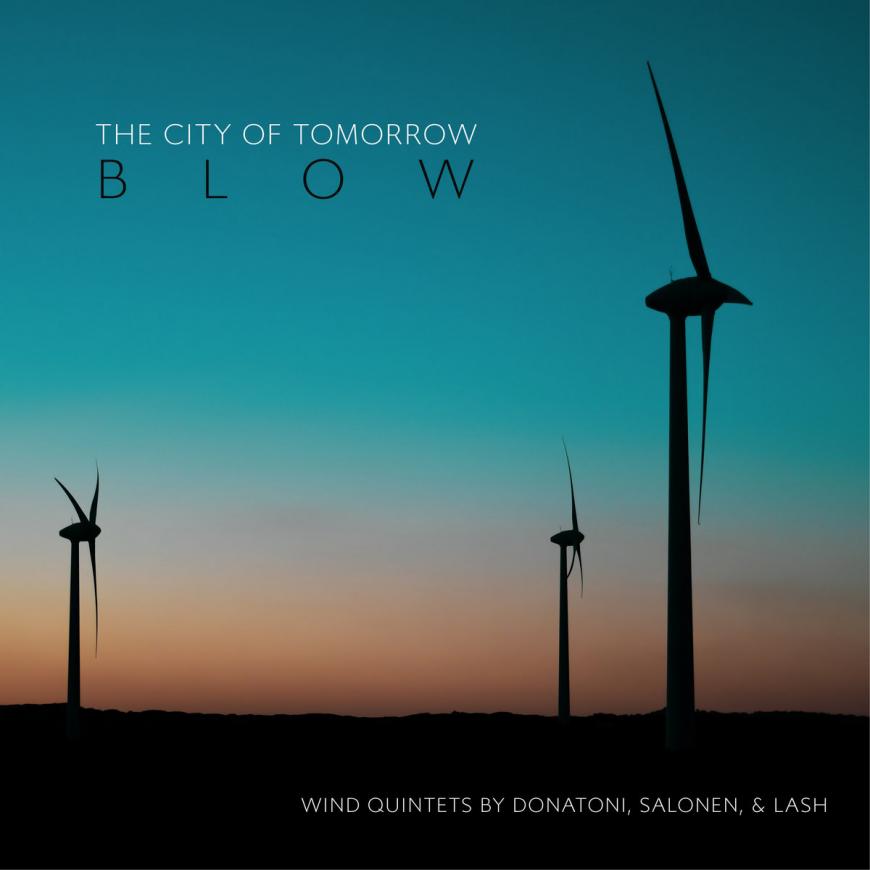
The City of Tomorrow is a standard wind quintet (Elise Blatchford, flute and piccolo; Stuart Breczinski, oboe and English horn; Rane Moore, B-flat and E-flat clarinets; Nanci Belmont, bassoon and contrabassoon; Leander Star, French horn) that wants to do nonstandard things. They hail from New York, Boston, and Memphis, and their specialties include commissions, multimedia projects, ritualistic staging, and electronics — things that 21st-century groups increasingly like to do.
Their new album, Blow (New Focus Recordings), though, is strictly audio with acoustical instruments — and the one group commission on hand, Hannah Lash’s Leander and Hero (2015), needs a verbal explanation to go along with the music. There is an agenda at work. Lash uses the Greek legend of Leander and Hero as a parable to present how climate change will bring on an apocalypse that has dire consequences for ordinary personal relationships. The lovers take the form of a pair of migratory birds represented by a piccolo and E-flat clarinet while the other instruments act as — of course — a Greek chorus.

There are instructions in the score in which performers are supposed to create a soft whistling effect by blowing into the mouth of another performer (tellingly, this was recorded in 2018 well ahead of the pandemic). It’s supposed to represent the risks we take in intimate relationships — and after what we’ve all been through, I can’t imagine this instruction being observed live even with fully vaccinated wind players.
Ultimately, it’s a rather pensive piece, easy on the ears, devoid of drama — even the section labeled “The Storm” is anything but turbulent — and not very absorbing if you were listening casually, unaware of the composer’s agenda.
Franco Donatoni’s Blow (1989) proceeds in fragments, with solo instruments taking turns trying to stand up to the rest of the gang who admonish, ridicule, and tiptoe around them in a dissonant language with no steady rhythm. Toward the close, there are some sustained low-key jeering and staccato taunts, with instructions for the last squalling chord to be held for exactly 13 seconds — which The City of Tomorrow faithfully observes.
One of Donatoni’s more renowned students, the San Francisco Symphony’s Esa-Pekka Salonen, is the composer of the album’s final — and best — composition, Memoria. The work has a convoluted history. The musical ideas came from Mimo, a piece that Salonen wrote as a young European avant-garde loyalist in Helsinki in 1982 and has since withdrawn. Two decades later while in Los Angeles (2003), Salonen fashioned a completely new piece out of the material, and it bears the stamp of the warmer, less doctrinaire composer who allowed L.A. to shape him.
From a subdued opening, a gently playful wind quintet emerges in a netherworld between a defined tonality and not, much like the orchestral music he was composing at the time. The complex music in the center doesn’t sound at all easy to play, but the accomplished fivesome doesn’t bat an eye. The last section — set off from the rest of the work by a long pause — suggests the title, a dour chorale in memory of Luciano Berio, who had just passed away that year.
Blow’s cover art is drolly humorous at first glance — a handful of wind turbines in air-polluted twilight. But is it a joke, or is it a serious statement about humanity facing its sunset years as fossil fuels heat up the planet? Or is it hope that this is the dawn of an age of renewable energy? You decide.




